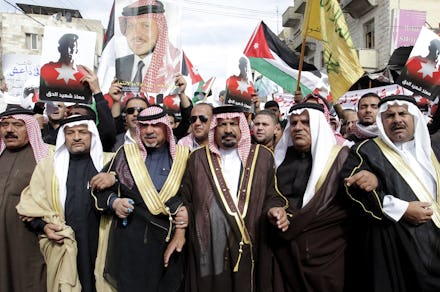The West Constantly Expects All Muslims to Denounce Terror. Here's What That Looks Like

There's a template to how Western countries respond to Islamic terrorism. First comes the manhunt for suspects and the trickle of gruesome details about the latest disaster. Then comes the powerful calls for solidarity in the face of terror, an affirmation of our freedoms and values that militants would seek to destroy.
Then inevitably the question comes: When will Muslims and Muslim organizations condemn this heinous act, and all vicious acts of terrorism, wherever they occur? This happened after a gunman shot and killed a Canadian soldier on Ottawa's Parliament Hill in October 2014.
This happened after a deranged would-be cleric took hostages at a shop in downtown Sydney in December. And it happened after the Charlie Hebdo massacre, when CNN golden boy Don Lemon asked a Muslim human rights lawyer, in all seriousness, if he supports the Islamic State group.
Those pundits and critics, xenophobes and Islamophobes finally have their answer. All who suspect that Arab nations and the world's 1.6 billion Muslims wipe crocodile tears in public and secretly clench their fists with glee at home need only look to execution of a Jordanian pilot by the Islamic State group to see the true face of Muslim condemnation.
Reuters reports:
Thousands of Jordanians packed the streets of the capital Amman on Friday, urging their monarch to step up air strikes on Islamic State to avenge its killing of pilot Mouath al-Kasaesbeh.
Many Jordanians have opposed their country's involvement in U.S.-led air campaign against Islamic State positions, fearing retaliation. But the killing of the recently-married pilot, from an influential Jordanian tribe, has increased support for the military push.
As citizens flooded the streets, Jordanian fighter jets have pounded Islamic State group targets across Iraq and Syria, striking weapons caches and training centers.
But these aren't just troops following orders. Video footage released by the Jordanian military shows pilots could be seen chalking messages on their missiles, including one that read, "For you, the enemies of Islam," the Independent reports:
It's not just Jordan: The Middle East, a region whose many ethnic and religious sects do not make for the portrait of regional solidarity, is seemingly united against on common enemy — the Islamic State group. The New York Times reports from Amman, Jordan:
There was one sentiment that many of the Middle East's competing clerics, fractious ethnic groups and warring sects could agree on Wednesday: a shared sense of revulsion at the Islamic State's latest atrocity, burning alive a Jordanian pilot inside a cage.
This would make sense. After all, mostly Muslim countries are affected far more by terrorism than Western nations. Research conducted by the the Global Terrorism Database at the University of Maryland shows that half of all terrorist attacks between 2004 and 2013 and 60% of fatalities due to terrorist attacks took place in Iraq, Afghanistan and Pakistan, all of which have mostly Muslim population.
Why it matters: The expectation that the world's 1.6 billion Muslims and their community leaders to denounce every act of terrorism isn't just non-sensical, but dangerously bigoted.
"This sort of thinking — blaming an entire group for the actions of a few individuals, assuming the worst about a person just because of their identity — is the very definition of bigotry," wrote Vox's Max Fisher after the Charlie Hebdo attack, arguing that the question reinforces the notion that that "they are guilty until proven innocent, that maybe there is something to the idea of collective Muslim responsibility for lone criminals who happen to share their religion."
We see this double standard at play not just in what we say about Islamic extremism but in what we don't say about other forms of terrorism not directly associated with Islamic. Just consider how the media described a January attack on the NAACP offices in Colorado Springs, Colorado, when "a balding white man" in his 40s dropped an explosive device near the building.
"We are comfortable with the image of Islamic terrorists, but unable to recognize the actions of Americans — white Americans, specifically — as terrorism," Ebony's Jamilah Lemieux told Mic's Elizabeth Plank at the time. "A planned bombing at an office of one of the nation's oldest civil rights groups ... what could possibly come to mind aside from 'hate crime' and 'terrorism?' The lack of injuries is a miracle, not a reason to downplay the horrific implications of this crime."
What's the right solution? Fisher argues that "we should treat the assumptions that compel this ritual — that Muslims bear collective responsibility, that they are presumed terrorist-sympathizers until proven otherwise — as flatly bigoted ideas with no place in our society," but that's not enough. The media asks for an apology after each Western attack but refuses to turn the camera on Muslim communities coming together in solidarity. It's time to put this narrative, like the Islamic State group, to bed once and for all.
Editor's Note: Feb. 12, 2015
An earlier version of this article cited and linked to Reuters, but did not include quotations around the phrase "thousands of Jordanians packed the streets of the capital Amman on Friday, urging their monarch to step up air strikes on Islamic State to avenge its killing of pilot Mouath al-Kasaesbeh." The story has been updated to fully attribute Reuters' language.